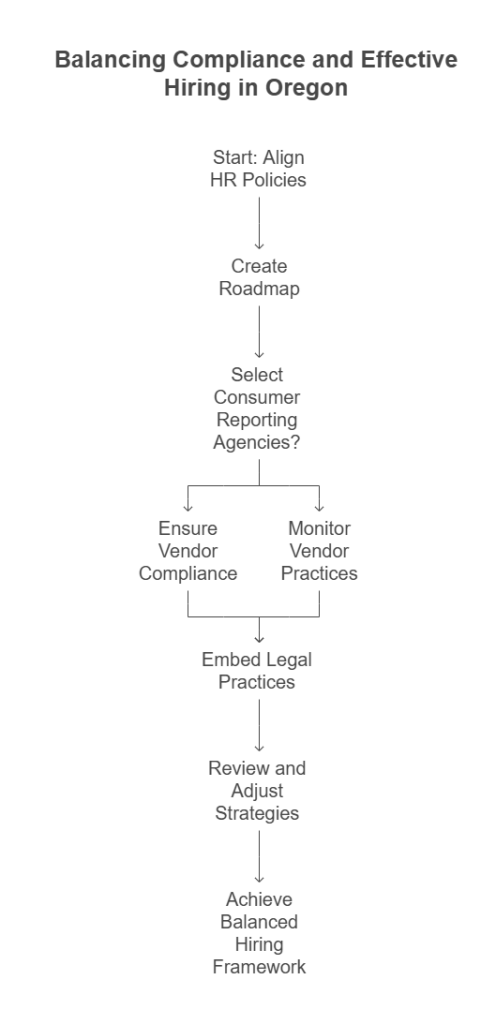Navigating the landscape of employment screening in Oregon can be a bit tricky for HR professionals. With a maze of laws and regulations, it’s important to stay compliant and informed. This practical guide breaks down the essential elements of Oregon's background check laws. Whether you're new to HR or a seasoned pro looking for a refresher, this guide has you covered.
Key Takeaways
- Background checks are essential in Oregon to safeguard workplace integrity and ensure informed hiring decisions, involving checks on criminal records, employment history, and sometimes credit reports.
- Employers in Oregon must comply with strict legal guidelines, providing clear disclosures and obtaining explicit consent before conducting background checks to prevent discrimination and maintain fair hiring practices.
- The Fair Credit Reporting Act (FCRA) aligns with Oregon laws, ensuring transparency and confidentiality in the handling of background information during the hiring process.
- Oregon's "Ban-the-Box" initiative prohibits asking about criminal history on job applications, focusing on candidates' skills first, and adding complexity for HR professionals to manage.
- Staying updated with continuous education and leveraging resources like SHRM and PBSA is crucial for HR professionals to maintain compliance and foster an inclusive hiring process.
Introduction
Imagine hiring a top candidate without knowing they're currently under investigation for fraud. Now, that's a nightmare no HR team wants to wake up to. In today's complex hiring landscape, thorough background checks play a vital role in safeguarding businesses from such risks. They are more than just a formality; they are crucial for informed decision-making and maintaining workplace integrity, especially in Oregon.
In Oregon, background checks serve as a key element in hiring practices, providing insights into a candidate’s history while ensuring a safe and productive work environment. They encompass a variety of checks, including criminal records, employment history, and sometimes even credit reports, to give employers a fuller picture of their prospective employees.
This guide aims to simplify Oregon's background check laws for HR professionals, helping you navigate legal requirements with ease and efficiency. We’ll break down the essentials of compliance, ensuring that your screening practices are not only effective but also legally sound.
EXPERT INSIGHT: As an HR professional with a global perspective, I’ve come to appreciate the complexities that different states, like Oregon, introduce into the employment screening process. One of the essential keys to succeeding in background screening is understanding how important it is for HR teams in the state to stay compliant with local laws while balancing technical aspects with empathy during the process itself. There should always be a balance between understanding the technicalities and executing them with confidentiality and respect. For HR professionals in Oregon, it’s essential to not only understand these laws but also to embrace them wholeheartedly - Charm Paz, CHRP
Understanding Oregon Background Check Laws
Oregon Employment Screening Overview
Background checks are a vital tool in the hiring process, providing a layer of assurance and insight into potential employees' pasts. In Oregon, these background checks are more than just a routine step—they're essential for safeguarding workplace integrity and ensuring that candidates align with company values. HR professionals in Oregon must navigate a landscape peppered with specific state mandates and broader federal guidelines, making the role of employment screening both crucial and complex.
Key Legal Requirements
Oregon laws require employers to follow a set of strict guidelines when conducting background checks to avoid discrimination and ensure fair hiring practices. Understanding these requirements is vital to maintaining compliance. Employers must provide clear, written disclosures to applicants and obtain explicit consent before conducting a background check. Additionally, any adverse action based on the results must be preceded by a pre-adverse action notice, allowing candidates a chance to dispute or discuss the findings.
Relevance of the Fair Credit Reporting Act (FCRA)
The Fair Credit Reporting Act (FCRA) serves as the national framework governing background checks, impacting how they’re conducted across the United States, including Oregon. This act ensures that there's transparency in the screening process, requiring employers to inform candidates how their data will be used and stored. Oregon's background check laws harmonize with the FCRA, reinforcing the need for accurate, fair, and confidential handling of all background information. For more on FCRA compliance, you can explore this in-depth resource.
Ban-the-Box Initiative
Oregon's "Ban-the-Box" initiative is a key piece of legislation that affects how employers screen potential employees. This law prohibits employers from asking about criminal history on job applications, thus reducing early-stage discrimination against individuals with past convictions. The initiative emphasizes evaluating candidates based on their skills first rather than their histories. Additionally, certain cities like Portland have their own variations on this law, adding layers of local complexity that HR professionals must navigate effectively.
By understanding these foundational elements, HR professionals in Oregon can ensure their hiring practices not only comply with legal standards but also contribute to a fair and equitable work environment.
Conducting Background Checks in Oregon
Conducting background checks in Oregon involves several key steps, and staying compliant is essential for HR professionals. Here's a straightforward guide to help you navigate this process.
Pre-Employment Screening Process
Start by establishing a clear pre-employment screening process. Begin with drafting a comprehensive checklist that adheres to legal requirements. This should include job-related screening criteria to ensure relevance and fairness. A critical first step is notifying candidates early about the background check, specifying the details clearly in job postings and application forms. Avoid pitfalls like requesting unnecessary information that might breach privacy laws. For instance, social media checks should be handled cautiously to avoid discrimination risks.
Consent and Disclosure
Compliance hinges on transparency. Always obtain the candidate’s consent before initiating a background check. This involves providing a disclosure notice, explaining the nature and scope of the check. It’s essential that this notice is a standalone document—not embedded within the application form or employment contract. Making this step clear and distinct emphasizes respect for the candidate’s privacy rights.
Evaluating Background Check Results
Once you receive the results, prudent evaluation is crucial. Focus on factors directly related to the job's requirements, and maintain objectivity. If something problematic arises, consider the “Relevancy Rule”—assessing whether an issue significantly impacts the candidate's ability to perform job duties. Should you decide against hiring based on the report, the Fair Credit Reporting Act mandates you provide the candidate with a "pre-adverse action notice," a copy of the report, and a summary of their rights. This ensures transparency and gives candidates a chance to dispute inaccuracies.
By following these strategies, you not only stay compliant with Oregon's background check laws but also streamline your hiring process, ensuring it is fair, transparent, and effective.
Oregon Background Check Agencies
Here is a table of related government websites that would be useful for Oregon business owners interested in background checks:
| Website Name | URL | Description |
|---|---|---|
| Department of Employment (Oregon) | https://www.oregon.gov/employ | Offers resources on labor laws, employment regulations, and licensing impacting background checks. |
| Department of Public Safety Standards and Training (Oregon) | https://www.oregon.gov/dpsst | Provides access to criminal history records and background check training standards for security personnel. |
| Judicial Department (Oregon) | https://www.courts.oregon.gov | Access to court records, legal information, and public records relevant to background checks. |
| Department of Corrections (Oregon) | https://www.oregon.gov/doc | Information on criminal records, parolees, and public safety concerns. |
| Office of the Attorney General (Oregon) | https://www.doj.state.or.us | Offers guidance on legal matters, including consumer protection and employment law. |
| Business Oregon (Economic Development) | https://www.oregon4biz.com | Provides resources for business development and compliance with state regulations. |
| Enterprise Information Services (Oregon) | https://www.oregon.gov/eis | Information on state IT policies, data privacy, and security for handling sensitive background check data. |
| Oregon State Archives | https://sos.oregon.gov/archives | Access to public records, historical documents, and archives useful for in-depth background research. |
| Oregon State Legislature | https://www.oregonlegislature.gov | Stay updated on laws and regulations passed by the state legislature that may affect background checks. |
| Oregon Health Authority | https://www.oregon.gov/oha | Information on health regulations, requirements for employee screenings, and background checks in healthcare settings. |
Balancing Compliance and Effective Hiring
Hiring in Oregon involves walking a tightrope between legal compliance and finding the best talent. You want a process that's not just legally sound but also efficient. First, start with your company's HR policies. These need to harmonize with Oregon's employment laws, blending strict compliance with your hiring goals.
Your strategy should carve out room for lawful flexibility. Consider creating a roadmap that aligns compliance checkpoints with hiring milestones. This isn't just about ticking boxes; it’s about embedding legal practices within a smooth, operational workflow. Regularly review and adjust these strategies to reflect any changes in laws or company goals.
Working with consumer reporting agencies can ease this balancing act. Select vendors who understand Oregon-specific requirements and offer robust screening services tailored to these laws. A solid vendor minimizes risk, but remember, the ultimate responsibility for compliance lies with your company. Keep an eye on their practices to ensure they adhere to both federal and state laws.
In essence, create a hiring framework where laws guide rather than hinder. This way, compliance supports, rather than obstructs, your quest to hire the best candidates.

Navigating Legal Challenges
In the realm of background checks, HR professionals in Oregon frequently encounter several legal challenges. One common hurdle is navigating the specific restrictions imposed by state and federal laws, which can sometimes feel like walking a tightrope between compliance and effective hiring. The Ban-the-Box initiative, for instance, is a legal requirement that removes the checkbox asking about criminal history from job applications. This means HR must wait until later in the hiring process to inquire about criminal records, which can complicate how candidates are evaluated.
Oregon law also emphasizes the importance of consumer protection, which results in safeguarding measures for job applicants. Employers must adhere faithfully to the Fair Credit Reporting Act (FCRA) and state-specific regulations that require clear communication and transparent processes when obtaining and using background check information. This includes providing proper notification to candidates about their rights and obtaining explicit consent before conducting checks.
To stay compliant and avoid legal pitfalls, HR departments should develop best practices rooted in both proactive and responsive strategies. Engaging with third-party consumer reporting agencies demands diligence to ensure these vendors themselves uphold all legal standards. Regular audits of hiring practices, training sessions on evolving laws, and maintaining updated documentation are crucial. Consulting resources like the Equal Employment Opportunity Commission (EEOC) and the Federal Trade Commission (FTC) can offer further guidance and clarify complex legal landscapes.
In summary, while the path is fraught with regulations, understanding and embracing the framework of Oregon's background check laws not only safeguards your organization from potential legal issues but also fortifies a fair and equitable hiring process.
Staying Updated on Oregon Background Check Laws
Staying on top of Oregon's dynamic background check laws isn't just a good idea—it's essential. Laws can change or new interpretations can emerge, making it crucial for HR professionals to keep their knowledge fresh. This includes initiatives like actively looking for resources, websites run by state governments, scholarly journals, and trade associations like SHRM. You may remain ahead of regulatory changes by taking part in HR forums, webinars, and continuing education. To make sure your business's screening procedures continue to be proactive and compliant, it's also critical to keep lines of communication open with legal counsel. HR professionals may prevent legal risks, and help create a transparent and bias-free hiring process by keeping up to date.
Continuous Education
Regular training should be a staple in every HR toolkit. Sign up for webinars, attend workshops, and participate in HR associations to stay informed. Learning never really stops, especially in the HR field where compliance is key. Consider rolling out quarterly refreshers within your team to discuss any legal updates or procedural changes.
Resources
Tap into reliable resources that consistently provide updates on HR practices and legal changes. Organizations such as the Society for Human Resource Management (SHRM) offer a wealth of materials and often host training sessions. Meanwhile, the Professional Background Screening Association (PBSA) focuses on industry standards and is a great go-to for specifics on background checks. Bookmark these sites and explore their newsletters or bulletins for timely information.
Keeping a finger on the pulse of legal changes not only safeguards your organization but also demonstrates a commitment to best practices and fairness in hiring.
Frequently Asked Questions
What information is typically included in an Oregon background check?
An Oregon background check typically includes:
- Criminal history (felonies, misdemeanors, and arrests)
- Employment verification
- Education verification
- Driving records
- Credit history (for certain positions)
- Professional license verification
The exact information included may vary depending on the type of check and employer requirements. Criminal records are often obtained through the Oregon State Police Criminal Justice Information Services (CJIS).
How far back do Oregon background checks go?
Oregon background checks generally go back 7 years for most criminal records and credit history. However, there are some exceptions:
- Felony convictions may be reported indefinitely
- Certain positions (e.g., healthcare, childcare) may require more extensive checks
- Arrests obtained from Oregon State Police checks may be limited to 1 year
The Fair Credit Reporting Act (FCRA) prohibits reporting of arrest records older than 7 years, but convictions can be reported regardless of age.
What is Oregon's "Ban the Box" law and how does it affect employers?
Oregon's "Ban the Box" law, effective since January 1, 2016, prohibits employers from asking about criminal history on job applications or before an initial interview. Key points include:
- Applies to all Oregon employers, public and private
- Employers can't exclude applicants solely based on past convictions before an interview
- If no interview is conducted, employers must wait until making a conditional job offer
- Exceptions exist for law enforcement, criminal justice system jobs, and certain regulated industries
This law aims to give individuals with criminal records a fair chance at employment by delaying criminal history inquiries until later in the hiring process.
Are employers in Oregon required to conduct background checks?
Oregon law doesn't generally require employers to conduct background checks, with some exceptions:
- Certain industries (e.g., healthcare, education, financial services) have mandatory check requirements
- The Oregon Department of Human Services and Oregon Health Authority must conduct checks on employees and volunteers
- Some positions working with vulnerable populations (children, elderly, disabled) require checks
While not always legally required, many employers choose to conduct background checks to ensure workplace safety and make informed hiring decisions.
How long does an Oregon background check usually take?
The duration of an Oregon background check can vary:
- Basic criminal history checks through Oregon State Police: 1-3 business days
- More comprehensive checks: 3-7 business days
- Checks requiring fingerprinting: Up to 2 weeks
Note that Oregon has a unique 14-day waiting period when requesting someone else's criminal records. During this time, the individual can review their records for accuracy before they're released to the requester.
Conclusion
In wrapping up, let's revisit the key takeaways from this guide: understanding and complying with Oregon background check laws is crucial for any HR professional. Staying informed about pre-employment screening, consent protocols, and the latest developments in the legal landscape can safeguard your organization against potential pitfalls.
By embracing these principles, you're not only ensuring legal compliance but building a stronger, more inclusive hiring process. Keep current with training, lean on resources like SHRM and PBSA, and review your practices regularly.
Additional Resources
- Oregon State Legislature. (n.d.). Background Check Laws. Retrieved from https://www.oregonlegislature.gov/bills_laws/Pages/OrLaws.aspx
- U.S. Equal Employment Opportunity Commission. (2012). Consideration of Arrest and Conviction Records in Employment Decisions. Retrieved from https://www.eeoc.gov/laws/guidance/arrest_conviction.cfm
- National Conference of State Legislatures. (2023). State Laws on Employment Background Checks. Retrieved from https://www.ncsl.org/research/labor-and-employment/state-laws-on-employment-background-checks.aspx
- Society for Human Resource Management. (n.d.). Background Checks. Retrieved from https://www.shrm.org/resourcesandtools/tools-and-samples/toolkits/pages/backgroundchecks.aspx
- Oregon Bureau of Labor and Industries (BOLI) - BOLI is the official state agency responsible for enforcing Oregon's labor laws. Their website provides comprehensive information on workers' rights, employment laws, and procedures for filing complaints. It's an authoritative source directly from the state government. Website: https://www.oregon.gov/boli/workers/pages/default.aspx
- Oregon State Legislature (Chapter 653) - This is the official source for Oregon's statutory law on minimum wages, employment conditions, and related topics. It provides the exact text of the laws as enacted by the legislature. Website: https://www.oregonlegislature.gov/bills_laws/ors/ors653.html
- Legislative Committee Services Publication - This document, published by the Oregon State Legislature, provides a comprehensive overview of various aspects of employment law in Oregon. Website: https://www.oregonlegislature.gov/lpro/Publications/EmploymentLaw.pdf

GCheck Editorial Team
Meet the GCheck Editorial Team, your trusted source for insightful and up-to-date information in the world of employment background checks. Committed to delivering the latest trends, best practices, and industry insights, our team is dedicated to keeping you informed.
With a passion for ensuring accuracy, compliance, and efficiency in background screening, we are your go-to experts in the field. Stay tuned for our comprehensive articles, guides, and analysis, designed to empower businesses and individuals with the knowledge they need to make informed decisions.
At GCheck, we're here to guide you through the complexities of background checks, every step of the way.






